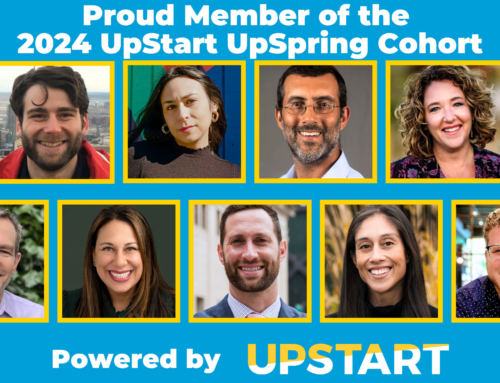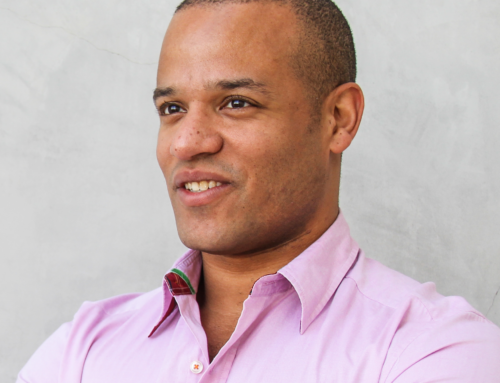May 24, 2017 | eJewish Philanthropy
By Maayan Jaffe-Hoffman
The merger of UpStart, Joshua Venture Group, Bikurim and the U.S. programs of PresenTense “is a game-changer for the field of Jewish innovation,” says Ana Robbins, executive director of Jewish Kids Group, Atlanta’s independent Hebrew school. “So much of what is cool in our Jewish world has ties to UpStart and the other organizations.”
The folks working at the four innovation organizations say they, too, started to see what Robbins described. UpStart, Bikurim, Joshua Venture Group and PresenTense were collectively touching Jewish innovators on their start-up trajectory. But it was not being done in any kind of coherent way.
“Someone who participated in a PresenTense program did not know where to go next. You’d leave the accelerator and not know what you could apply for next,” explains UpStart CEO Aaron Katler.
The organizations started talking about this challenge and how they could make it better. The result was a decision that it was time for the well-known orgs to be as innovative as their clientele. This merger isn’t about one plus one plus one plus one equals four. Rather, “it is about changing what the future looks like in terms of supporting and driving innovation in a Jewish space,” says Katler.
In the future, UpStart will have broader scope within the Jewish community and be able to better address core community challenges, such as hindered access or lack of deep meaning – and help reverse negative trends, he says.
Further, while the new UpStart hopes to increase the number of people it directly reaches (collectively the organizations touched around 3,000 people to date), the growth agenda is not that UpStart can accept 50 instead of 9 to 10 institutions, but rather that it will become a national umbrella organizations that indirectly reaches thousands of Jewish innovators.
“Lots of communities around the country don’t have the resources, don’t have UpStart in their cities,” says Katler. “We are now in 13 cities around the country and we know we can grow that exponentially – but we see it is as being more ground up than top down.”
On the one hand, UpStart will be “an action-oriented think tank,” tracking the successes of various innovations, codifying best practices and helping to disseminate them. On the other hand, it will be a one-stop shop for the tangible tools, networks and resources that Jewish innovators need to succeed.
In a recent report, Jewish Communal Fund and Slingshot explained “innovative” in the nonprofit world is a short-cut term to describe organizations that have built the drive for relevancy and impact into their DNA. Innovation is not an end goal, but rather a mode of operating.”
The merger was “one of effectiveness and not efficiency.”
It will cost the new UpStart more in the beginning phases than the combined amount that each organization spent on their own before.
It is also an innovative answer to the demand of bold Jewish communal entrepreneurs.
Benay Lappe, founder of SVARA, which describes itself as “a traditionally radical yeshiva dedicated to the serious study of Talmud and committed to the Queer experience,” says the merger is exactly what many in the Jewish innovation sector need as a model and for support.
“We are no longer looking to bring folks we attract back to the old center,” says Lappe. “We’re creating a new Jewish center which, quite quickly, has already begun attracting those from the mainstream to join the new center – though that isn’t the goal.
“But virtually none of the founders of Jewish start-ups are business people. We’re rabbis, teachers, artists, activists – people with a dream, lots of passion and the stomach for risk-taking. Making a Jewish start-up successful requires skills few of us have. UpStart gives us those skills.”
Lappe says the Judaism of the past was innovated by “a small group of fringy, radical, outsider guys whom we now call rabbis.” The Judaism of the future is being innovated by a group of fringy, radical, outsider folks that can be called “UpStarters.”
More than a dozen funders collectively invested in the merger, making it easier for UpStart to charge forward.
“Typical consensus is that funders lead and call the shots. In this case, it’s a total partnership, where these funders are open to new, innovative ways of making something complex quite simple and taking what could have been a maddening process incredibly streamlined,” Katler says.
UpStart engaged a collaborative philanthropic advisory committee and will complete its vision within the next year and a half.
Ultimately, the new UpStart system will also make it easier for funders to invest in innovation, says Jaime Rapaport Barry, director of marketing and communications for UpStart. She says UpStart will help funders navigate both seed investments in Jewish start-ups and innovations happening in other parts of the field.
Likewise, the face of Jewish life and innovation will look different in a decade because of the impact of this new network, says Barry.
Lappe agrees. She says organizations like her own are important because they are turning on young people – many of whom were alienated from Jewish life – “to a Judaism that’s smarter and more sophisticated than they ever imagined, giving them a Jewish community they can feel at home in, and creating a new cadre of players who are stepping into Jewish leadership roles and reshaping what the Jewish future looks like.”
Our purpose is to enable entrepreneurs to bring bold Jewish ideas to light. We help them reach Up to people in new ways that are meaningful, more inclusive, and create a brighter future for our Jewish community and the world we share.






